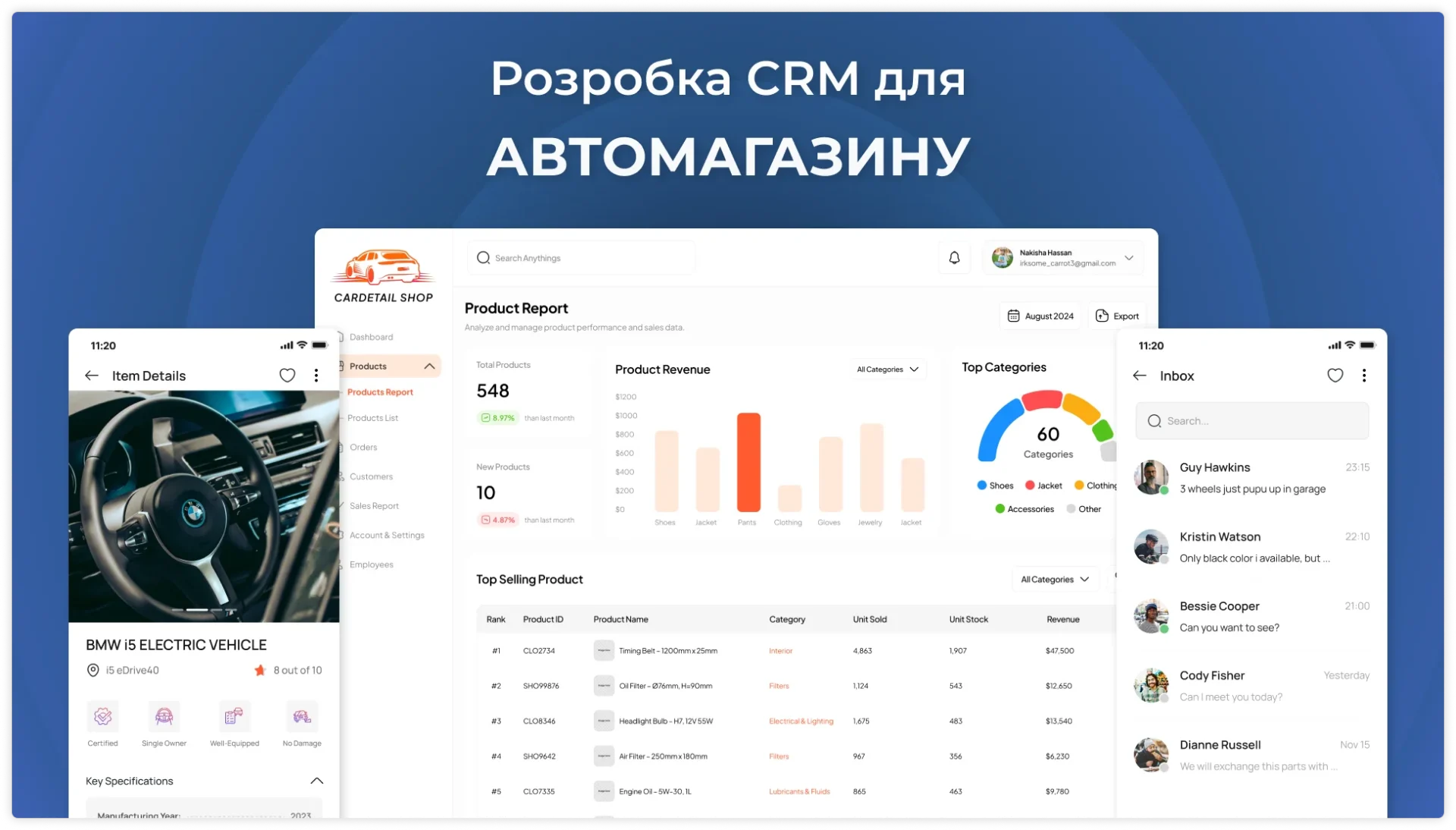
The automotive aftermarket is changing rapidly: competition is growing, the range is expanding, and customers expect impeccable service and instant selection of parts. No driver can imagine life without a car. When a car breaks down, every minute of waiting for repair is discomfort, frustrated plans and missed opportunities. Therefore, car shop owners who rely on outdated management methods risk losing ground.
AVADA MEDIA offers a modern approach – automation of all key processes: from the instant selection of spare parts by VIN code to warehouse and financial management. The development of a CRM system for a car shop allows not only to optimize business processes, but also to bring customer service to a new level, providing the speed and accuracy that the modern market demands.
A CRM system for a car shop is a powerful tool that allows you to automate and optimize all business processes related to the sale of auto parts, consumables for cars and car accessories. This software solution can significantly simplify customer accounting, sales management, warehouse and logistics. In addition, CRM for an auto parts store includes a program for selecting spare parts by the car’s VIN code, managing balances, orders, and communication with customers. This is an effective way to reduce routine tasks and speed up customer service.
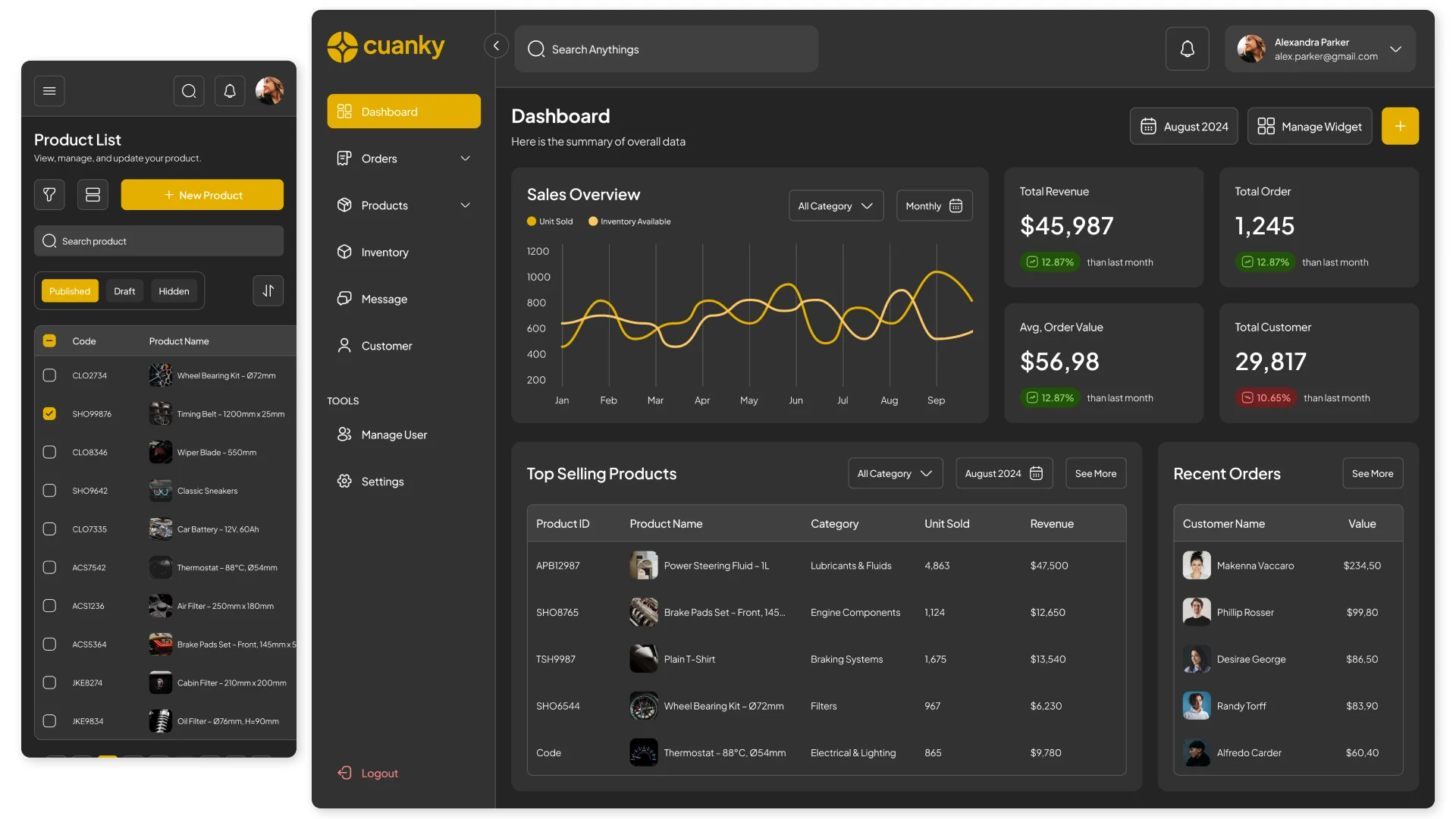
Managing a car shop is associated with the daily coordination of a large number of variables: goods, suppliers, warehouses, customers, service. All this gives rise to a number of systemic problems that hinder growth and reduce the profitability of the business.
Developing an effective management system is an investment, not a cost, because it gives the business many advantages.
CRM example for an auto parts store
If the number of orders grows, it takes a lot of time to manually search for auto parts, and errors often occur in orders and inventory management – you critically need a program for accounting for goods in an auto parts store. You should also order it if you want to increase employee productivity and responsibility, reduce costs, increase customer loyalty, or make more informed business decisions. Your own CRM is a strategic tool for business growth.
A CRM system for a car shop is not only a digital tool for accounting for goods or customers. It can become the center of management of the entire business, reflect the logic of your internal processes, the type of customers, the specifics of the product range and strategic goals. To create an effective, really useful CRM that not only duplicates Excel, but strengthens your company, you need to determine its functionality as accurately as possible. features that are mandatory for any auto shop, as well as custom modules that are customizable to the specifics of your particular format.
In the basic CRM for auto shops , there is not a universal set of options, but a vital infrastructure for stable growth. That is, the minimum that provides control over business processes and allows you to scale without chaos and global changes in software.
Work with the product range and warehouse
In auto stores, the assortment often includes thousands, and sometimes tens of thousands of items, with crosses, analogues, various articles and dependence on car models. Therefore, CRM should have a powerful commodity accounting module for:
Order and Sales Management
CRM can take care of the entire cycle of working with an order: from the moment of registration to its closure, including possible returns or exchanges. This involves:

Working with the customer base
A modern CRM for an automotive parts store is a full-fledged knowledge base about each customer, and not just a list of phone numbers. In it, you can:
Integration with payment and accounting systems
CRM can integrate with accounting software, fiscalization and online payment systems to reduce dependence on the human factor and make the business more predictable. This allows you to:
Differentiation of access rights
For auto shops with several points or a branched structure, it is important to configure access rights. A custom CRM can:
Analytics & Business Insights
A modern CRM system for a car shop can not only store and structure data, but also turn this data into valuable business insights. This allows the owner or manager to see what and why is happening in the company right now, and what it affects. With such software, next is possible:
It is also possible to connect custom dashboards with KPIs for different levels of staff: the owner sees the strategic picture, the sales manager sees the team’s effectiveness, and the manager sees his own goals and achievements.
Each auto store has its own direction and format of trade – retail, wholesale, marketplace or service center. One works with a narrow segment – for example, spare parts for trucks or premium brands, and the other – with a mass assortment of auto chemicals or accessories. That is why, in addition to the basic functionality, it is desirable to adapt CRM to a specific business model.
CRM for auto shops with spare parts
For a store management program with spare parts for cars, trucks and special equipment, you need the following functions:
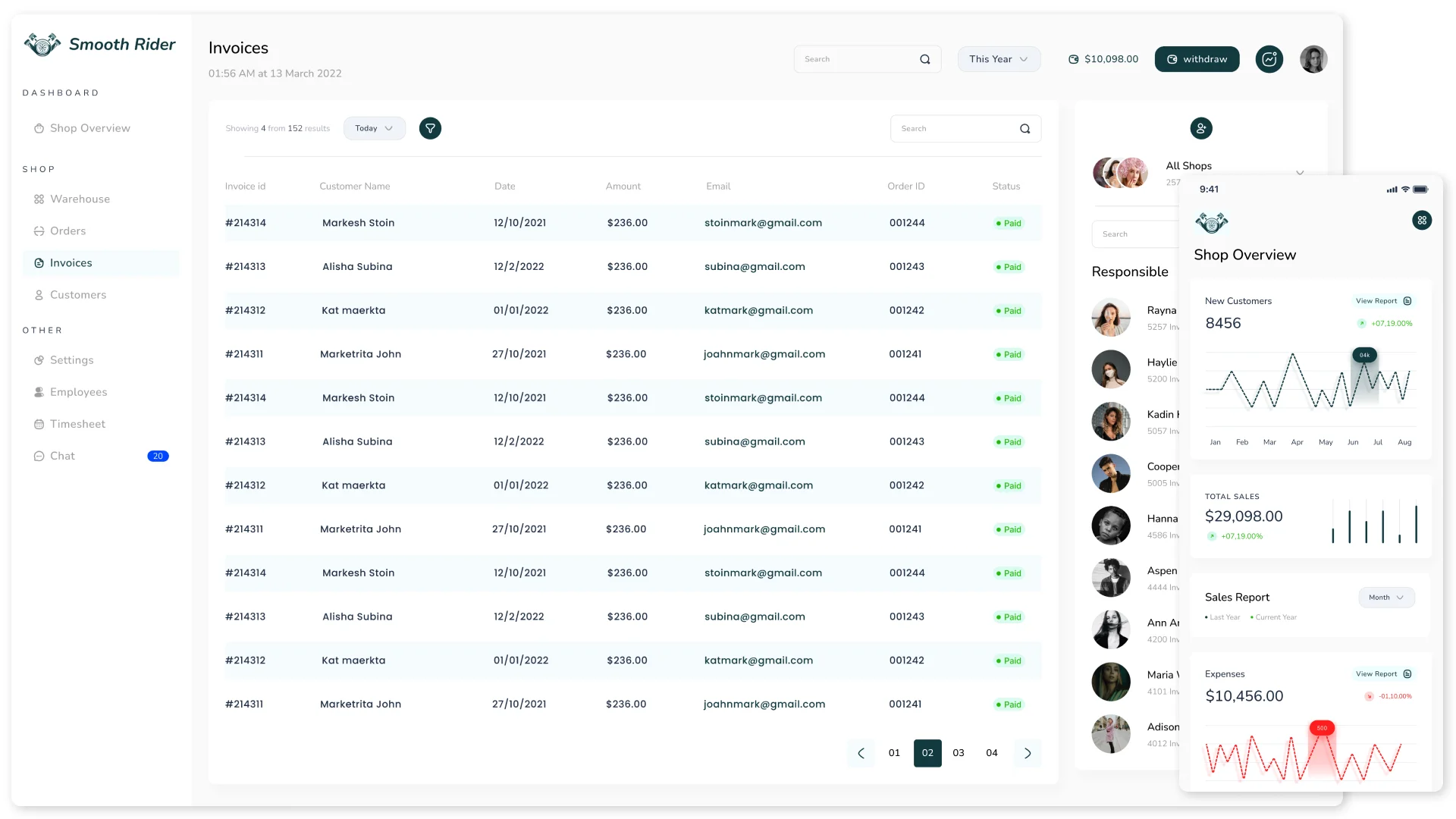
CRM for a store of auto chemicals, accessories and electronics
In such stores, the visual component and purchase motivation systems play a key role. Here you can implement quite useful features:
CRM for tire centers
The sale of tires and wheels is a separate area of trade in automotive products. It requires the following CRM features:
CRM for Wholesale Suppliers and Distributors
If your auto shop operates in the B2B segment, you can implement the following in CRM:
Not sure which modules to choose? We help you go through the entire path of automation of an auto parts store – from idea to implementation. Together with you, we will form an effective digital ecosystem for your auto shop, which will reduce costs, increase the speed of order processing and improve customer experience.
There are many ready-made CRM systems for auto stores on the market, which promise a quick launch and universal functionality. However, for an automotive business working with a huge product range, complex logistics, technical advice and after-sales service, a standard tool is usually not enough. Here are some key reasons why ordering a CRM system for a car shop is the most reasonable solution.
Maximum adaptation to business processes
Ready-made CRMs force businesses to adapt to common patterns. An individual system – on the contrary, adapts to your store, the specifics of the product (spare parts, auto chemicals, accessories), storage features in the warehouse, procurement cycles, interaction with customers, etc.
Flexible integration with other systems
You may already have an online store, a warehouse program, accounting, or marketplace accounts. An individual CRM can be integrated with any internal or third-party services – marketplace APIs, 1C modules, loyalty programs, etc.
Development prospects
It is not always possible to add new functions to the ready-made software. At the same time, your own program can develop along with the business: you can add points of sale, new areas (for example, car dismantling, tire fitting, trade-in), cash register modules, mobile applications or AI analytics.
Reliability of the security system
Unlike a custom CRM, standard solutions do not always allow you to implement a multi-level access system: differentiation of rights by roles, logging of activities, protection against leakage of the customer database or commercial information. Such options are limited or require additional paid modules.
Ownership and stability
With an individual CRM, you get full ownership of it: no monthly payments, no surcharges for each user, no risk of disconnecting or shutting down the platform.
Interface and UX for your team
The interface is developed based on real scenarios of your managers, warehouse, and marketers. Nothing superfluous, just something that speeds up your business processes. This significantly reduces the time for staff training and minimizes errors.
And, finally, a unique CRM is a technological advantage that is difficult for competitors to replicate. It enhances the speed of service, the accuracy of recommendations, team efficiency, and customer loyalty.
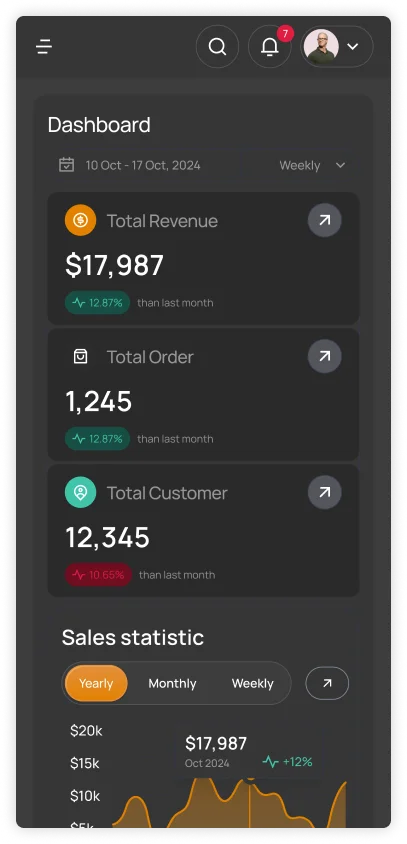
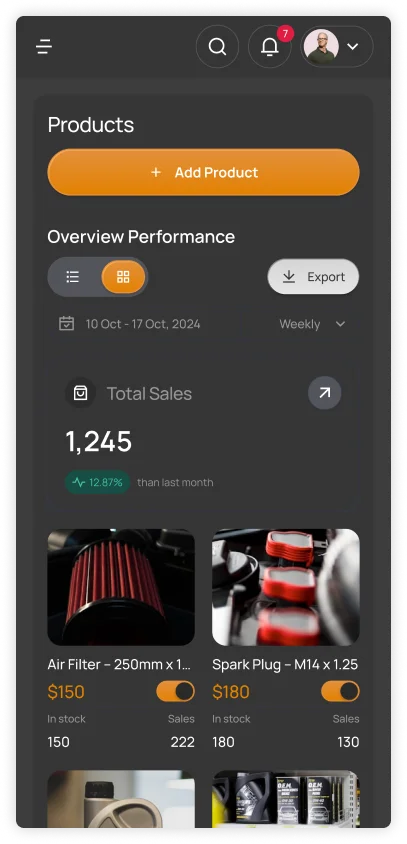


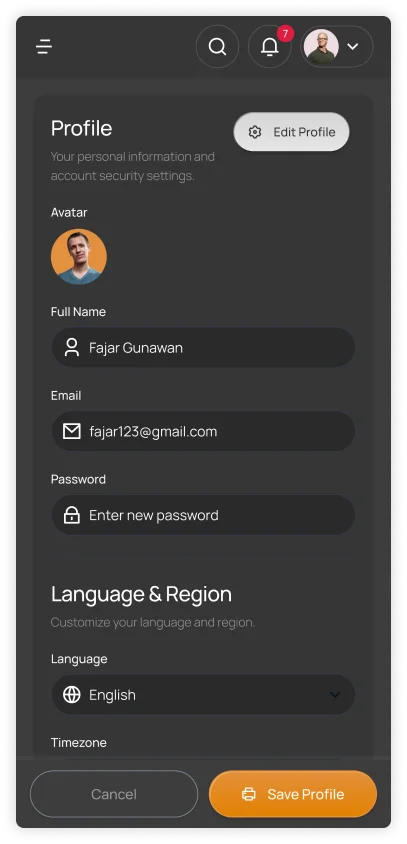
Adaptation of CRM for a car dealership to a mobile application
CRM is not only an auto parts store accounting program, but a multifunctional assistant that takes on many tasks. Therefore, creating a high-quality program requires some time and experience, as well as a professional and consistent approach, where each stage is important.
At the first stage, analysts conduct a study of the specifics of the auto shop: what brands and models of cars are serviced, which categories of spare parts are the most popular, how logistics is organized. They analyze the main problems in the selection and sale of parts, identifying key business processes that require automation: selection of auto parts by VIN code of the car, management of warehouse balances of rare parts, etc.
Based on the analysis, a detailed technical specification is developed, which describes all the functions and requirements for the software product, including warehouse management automation, integration with supplier databases and online sales platforms. They determine how the selection of spare parts by vin code online will be implemented, whether integration with manufacturers’ catalogs, accounting and payment systems, delivery services is needed, and how it will work A program for the selection of spare parts for American cars.
At this stage, the CRM structure is developed, determining the links between modules, the logic of selecting spare parts, and the process of processing orders. Next, with the help of Moqups, Figma, Adobe XD, a prototype is created that allows you to visualize the interface and functionality in order to test the program for an auto parts store even before its development begins. The prototype is shown to the customer and adjustments are made based on the feedback.
Designers develop a unique interface for the management system that matches the visual style of your auto shop and takes into account the needs of sales and purchasing, warehouse and logistics managers, especially when working with a large amount of visual information (photos of spare parts, car diagrams). Particular attention is paid to the visualization of data on warehouse balances, orders, customers, so that the information is easily perceived and analyzed.
UI/UX design is developed taking into account the ease of use on different devices: computers, tablets, smartphones, because managers can work with the system both in the store and on the road.
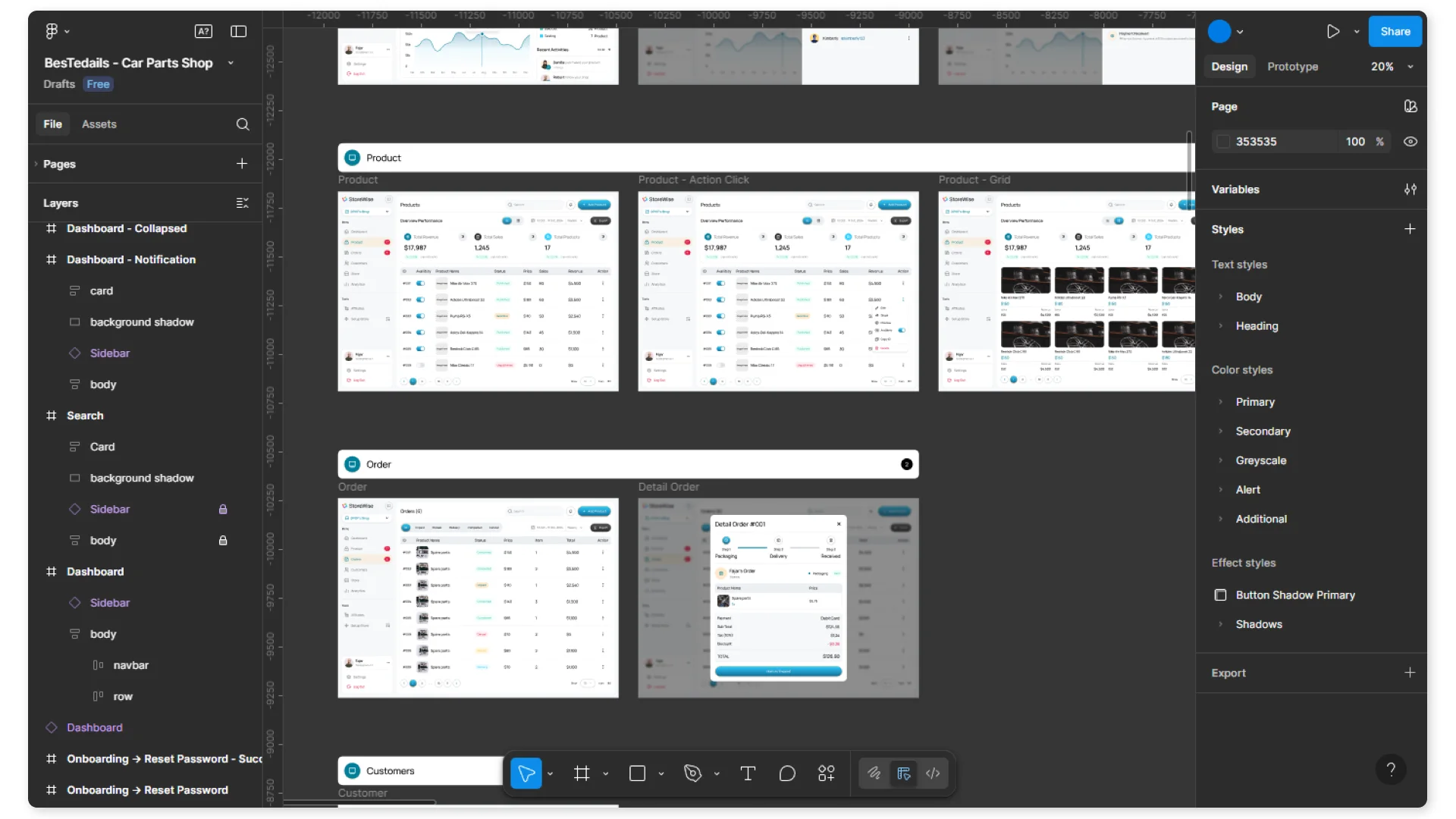
Programmers create code for the implementation of the server and client parts of CRM, as well as API integration for synchronization with external databases. For the frontend, that is, the user interface, modern programming languages, libraries, and frameworks are used: React, Angular, Vue.js, JavaScript, TypeScript.
For the server side of the system, Node.js, Python, Java, PostgreSQL, MySQL, MongoDB databases, as well as Docker, Kubernetes, Git tools are used. These technologies allow you to create a reliable and scalable backend that provides fast and secure processing of large amounts of data, integration with spare parts catalogs, and work with VIN codes.
QA engineers test the functionality, performance, security, and usability of the system. They check how the system copes with a large number of requests to search for spare parts, how quickly reports are generated, how accurately the program for selecting spare parts by VIN code works, and whether orders are processed correctly. Particular attention is paid to testing integrations with other services to make sure that data is transmitted correctly.
After successful testing, the CRM system is deployed on the customer’s servers or in a cloud environment, adapted to the needs of the business and tested on the first customers in real conditions of the store. At this stage, staff training must be carried out so that all users can work effectively with the program.
Constant updating of the system is necessary to adapt it to changes in business, market and new customer requests. Any program for automating an auto parts store needs to optimize the speed of processing requests, expand functionality, and introduce new modules.
Since each project has unique requirements, scope, and business goals, the cost of developing a CRM system for a car shop depends on a number of factors. Key aspects that form the budget:
A system for a small store with one warehouse and several managers will be simpler in architecture than a CRM for a chain of auto stores with centralized logistics and an extensive team. The more users, roles, access rights, and objects (warehouses, points of sale, interaction channels), the more complex the implementation and the higher the budget.
The price depends on what business logic needs to be implemented. Is the system needed only to keep track of customers and orders, or will it include analytical dashboards, automated logistics, marketing, and after-sales service? Do you need additional integrations and intelligent features such as product recommendations, demand forecasting, dynamic pricing?
Individual interface design with adaptation to employee work scenarios, mobile version, custom control panels – all this requires additional resources for engineering, design and front-end development.
In general, the more processes you need to automate, the more complex the logic and the greater the number of scenarios. The implementation of each function requires a detailed business analysis and a well-thought-out architecture, that is, more time and effort.
The cost also depends on how the CRM is deployed:
When implementing CRM as a long-term tool, you need to take into account the costs that affect the overall budget in the future: technical support, adaptation to changes in the business, expanding functionality, updating dependencies and protection.
Urgency always requires more resources. If the project needs to be implemented in a short time, additional specialists can be involved in the development, which also affects the final cost.
CRM screens for a car shop
AVADA MEDIA provides comprehensive CRM development services for auto shops, creating programs from scratch and scaling existing solutions in accordance with new business needs. Dedicated teams of specialists with deep expertise in automating an online auto parts store and a local auto shop use advanced technologies and methodologies to ensure high performance, reliability and security of programs. A CRM system for a car shop from our developers will allow you to instantly respond to customer needs, find rare spare parts and provide a service that exceeds expectations.
We ensure that your auto parts store software will not only meet your current needs, but also scale with the growth of your business.
Is it possible to integrate CRM with an online store for the sale of auto parts?
Yes, it allows you to automate the process of processing online orders, synchronize data on customers and warehouse balances, as well as provide customers with up-to-date information about the availability and prices of spare parts.
Does the auto shop software support different currencies and languages?
The auto shop software can be configured to work with different currencies and languages, which is especially important for stores that work with customers from different countries or sell spare parts for imported cars.
Can I access the system from a mobile device?
To do this, an adaptive interface of the CRM system is being developed, which provides convenient access from any mobile device.
Is it possible to set up automatic reports on sales and stock balances in CRM for auto parts?
Spare parts software can automatically generate various reports, including sales, stock balances, customer activity, and others. You can set up a schedule for generating reports and receive them by email.
Is it possible to integrate a management system for a car shop with loyalty programs?
Yes, it will allow you to track each customer’s bonuses, discounts, and purchase history, create personalized offers, and increase customer loyalty.
Can I transfer data from Excel spreadsheets or another program to a new CRM?
Data migration is a critical step in system implementation. You can import historical data from Excel, 1C, Google Sheets, or other sources into an individual CRM if they have a structured format. This allows you to save your customer base and analytics without loss.
Can I use the system in the absence of the Internet?
Depending on the architecture, a CRM can have an offline mode or a mobile app that allows you to retain key functions even without a connection. You can also implement caching of recent activity on the device.
How is CRM protected against customer leakage or fraud?
The system can have a multi-level access system: export restrictions, tracking employee actions, IP filters, logging sessions and activities. This significantly reduces the risk of information leakage.
How can CRM increase employee engagement?
In the program, you can set up a bonus system or ratings based on KPIs – for example, the number of successful sales, order processing speed, or customer retention. This is convenient for automating HR motivation.
If the auto shop is expanding, can the CRM be adapted?
If you order an individual CRM development for a car shop, you can make changes and scale it in the future: add branches, new modules, users, integrations. And for this, you do not need to change the program globally.
Our works
Contact the experts Have a question?
Developed by AVADA-MEDIA™
The user, filling out an application on the website https://avada-media.ua/ (hereinafter referred to as the Site), agrees to the terms of this Consent for the processing of personal data (hereinafter referred to as the Consent) in accordance with the Law of Ukraine “On the collection of personal data”. Acceptance of the offer of the Consent is the sending of an application from the Site or an order from the Operator by telephone of the Site.
The user gives his consent to the processing of his personal data with the following conditions:
1. This Consent is given to the processing of personal data both without and using automation tools.
2. Consent applies to the following information: name, phone, email.
3. Consent to the processing of personal data is given in order to provide the User with an answer to the application, further conclude and fulfill obligations under the contracts, provide customer support, inform about services that, in the opinion of the Operator, may be of interest to the User, conduct surveys and market research.
4. The User grants the Operator the right to carry out the following actions (operations) with personal data: collection, recording, systematization, accumulation, storage, clarification (updating, changing), use, depersonalization, blocking, deletion and destruction, transfer to third parties, with the consent of the subject of personal data and compliance with measures to protect personal data from unauthorized access.
5. Personal data is processed by the Operator until all necessary procedures are completed. Also, processing can be stopped at the request of the User by e-mail: info@avada-media.com.ua
6. The User confirms that by giving Consent, he acts freely, by his will and in his interest.
7. This Consent is valid indefinitely until the termination of the processing of personal data for the reasons specified in clause 5 of this document.
Send CV
Contact us in any convenient way for you:
+ 38 (097) 036 29 32